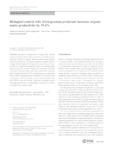Use este identificador para citar ou linkar para este item:
http://www.alice.cnptia.embrapa.br/alice/handle/doc/1022696| Título: | Biological control with Trichogramma pretiosum increases organic maize productivity by 19.4%. |
| Autoria: | FIGUEIREDO, M. de L. C.  CRUZ, I.   SILVA, R. B. da   FOSTER, J. E.   |
| Afiliação: | IVAN CRUZ, CNPMS. |
| Ano de publicação: | 2015 |
| Referência: | Agronomy for Sustainable Development, Paris, v. 35, n. 3, p. 1175-1183, 2015. |
| Conteúdo: | Spodoptera frugiperda is a major pest causing maize yield loss in Brazil. There is therefore a need for control methods, notably for organic farming because classical pesticides are not allowed.A potential solution for organicmaize is to apply the biological control agent Trichogramma pretiosum to reduce S. frugiperda populations. Here, we tested the application of one, two, or three releases of T. pretiosum. We measured plant damage ratings, egg masses parasitized, and grain yield. Results show that 79.2 % of egg masses were parasited. Maize yields for parasited plots increased of 701 kg/ha versus control plots. This result equals a 19.4 % gain of productivity and US$96.5 gain per hectare. Therefore, biological control with egg parasitoids is a promising alternative to control S. frugiperda in organic maize |
| Thesagro: | Controle biológico Agricultura biológica |
| Palavras-chave: | Parasitóide de ovos Monitoramento Feromônio armadilha |
| Digital Object Identifier: | 10.1007/s13593-015-0312-3 |
| Tipo do material: | Artigo de periódico |
| Acesso: | openAccess |
| Aparece nas coleções: | Artigo em periódico indexado (CNPMS)  |
Arquivos associados a este item:
| Arquivo | Descrição | Tamanho | Formato | |
|---|---|---|---|---|
| Biologicalcontrol4.pdf | 429,19 kB | Adobe PDF |  Visualizar/Abrir |









